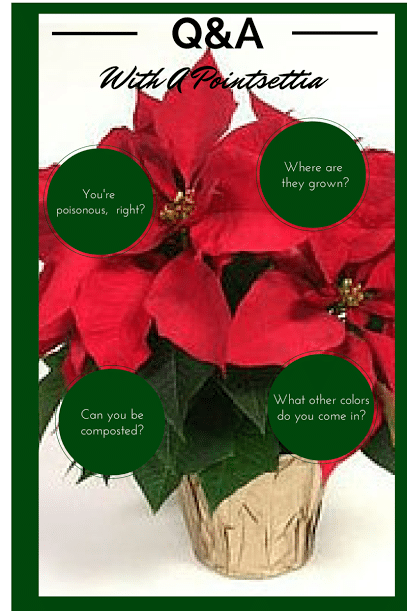
Q: David says poyn-set-tee-ah and I say poyn-set-ah. Who is right?
A: Both names are common, but David is right—it’s poinsettia. U.S. Ambassador Joel Poinsett discovered the plant in Mexico and brought it to the U.S. in the early 1800s. That’s why the plant is named after him. According to legend, the red leaves changed color on Christmas Eve. To honor this tradition, people sell poinsettias during the holidays.
Q: Poinsettias are poisonous, right?
A: Yes, if you eat handfuls of the leaves you can get an upset stomach and if you are allergic to latex you can have a reaction to the white sap from a broken stem but they are NOT toxic.
Q: Do they come in other colors besides red?
A: Yes! They come in cream, pink, white and two-toned varietals that I love such as Jingle Bells and Ice Punch.
Q: Where are they grown?
A: They mostly bloom in November and December and growers primarily cultivate them in California and North Carolina.
Q: How do I buy a good one?
A: Make sure: the soil is not too wet/dry, non-rolled or yellow leaves, and that the buds in the center are plump and unopened.
Q: How do I care for my poinsettia?
A: Obviously now I know they don’t like the cold so put in a sunny, draft free area. Check your door and windows for any drafts. Remember a 1/8 gap around your door or window is equal to a 6” brick hole in your wall. Signs your windows are costing you money! You don’t want to leave your poinsettias out in the cold. Only water them when the soil is dry to the touch-like 1-2 times a week. If you decide to keep the foil on, pierce a hole in the bottom so excess water can drain and place on a saucer to protect your surface.
Q: Can they be composted?
A: Yes, but if you want to keep an organic garden, you may not want to use it. They may have treated the plant with pesticides.


